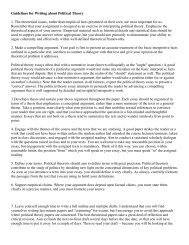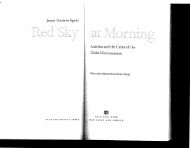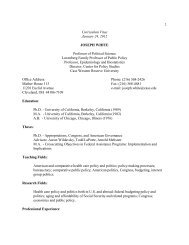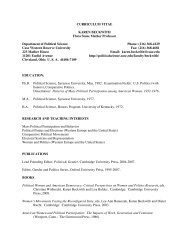POSC 370/470 - Department of Political Science - Case Western ...
POSC 370/470 - Department of Political Science - Case Western ...
POSC 370/470 - Department of Political Science - Case Western ...
You also want an ePaper? Increase the reach of your titles
YUMPU automatically turns print PDFs into web optimized ePapers that Google loves.
<strong>Case</strong> <strong>Western</strong> Reserve University<br />
Pr<strong>of</strong>essor Pete W. Moore<br />
216-368-5265<br />
pete.moore@case.edu<br />
Office Hours: Tuesday and Thursday 1-3:30 or by appointment (Mather House 219)<br />
This course is designed to comparatively examine different contexts <strong>of</strong> ethnic, nationalist, and religious<br />
violence. Students will engage in collaborative research projects as well as individual writing<br />
assignments to explore variation in the sources and effects <strong>of</strong> this type <strong>of</strong> violence. The course begins<br />
by exposing students to some <strong>of</strong> the classic philosophical tracts on what constitutes ethnicity and identity<br />
and then moves to historical case studies. Students will be organized into groups to represent and<br />
simulate actual political and social actors in the Middle East, Africa, Asia, and North America. These<br />
groups will present to the class their organization’s goals and resort to violence. The rest <strong>of</strong> class will<br />
then critically question the players to illuminate motives and ambiguities.<br />
Assigned Texts<br />
For each lecture, there are assigned readings from books and articles. All readings are on reserve in the<br />
library. Four texts comprise much <strong>of</strong> the readings for each class. The texts are available in the bookstore:<br />
o Altina Waller, Fued: Hatfields, McCoys, and Social Change in Appalachia, 1860-1900<br />
o Fergal Keane, Season <strong>of</strong> blood: A Rwandan Journey<br />
o Shaul Mishal and Avraham Sela, The Palestinian Hamas<br />
Grades and responsibilities<br />
Students are responsible for the material covered in the lectures as well as assigned readings.<br />
Grading is comprised <strong>of</strong> four components:<br />
1. Mid-term examination 20%<br />
2. Red team presentation (group) 15%<br />
3. Red team paper (individual) 25%<br />
4. Final examination 0%<br />
In addition to the mid-term and final, class simulations (Red Teams) will also be scheduled. Each student<br />
will comprise a team designed to present an account <strong>of</strong> that group’s resort to violence. Each member will<br />
present a 7 page double-spaced (minimum) to 10 page (maximum) analysis <strong>of</strong> their group’s goals, reasons<br />
for action, and expectations. The presentation to class (and defense against questioning) will be a team<br />
effort. The paper will be an individual effort. You will receive a grade for each.<br />
LECTURES AND SIMULATIONS<br />
1
**Please turn <strong>of</strong>f mobile phones<br />
**More than two unexcused absences from class will result in failure.<br />
**Lap tops may only be used in class for note taking. Please see me for permission<br />
o Altina Waller, Fued: Hatfields, McCoys, and Social Change in Appalachia, 1860-1900<br />
o Fergal Keane, Season <strong>of</strong> blood: A Rwandan Journey<br />
o Roberto Saviano, Gomorrah: Italy’s Other Mafia<br />
In the first part <strong>of</strong> the course we will examine general approaches to the concepts <strong>of</strong> power and<br />
conflict in the modern world. Gain an understanding <strong>of</strong> how each author defines the subject, the<br />
problem, and the argument.<br />
Week 1<br />
8/24<br />
Introduction: Modern Power<br />
8/26<br />
Power and Violence<br />
Hanna Arendt, “On Violence”<br />
Week 2<br />
8/31<br />
Power and Conflict<br />
Hanna Arendt, “On Violence”<br />
James Scott, “Behind the Official Story”<br />
9/2<br />
Michel Focault, “The body <strong>of</strong> the condemned”<br />
Week 3<br />
Power and the modern state<br />
9/7<br />
Michel Focault, “The body <strong>of</strong> the condemned”<br />
9/9<br />
Film: Battle <strong>of</strong> Algiers<br />
Week 4:<br />
In this section <strong>of</strong> the course we examine an historical American conflict, the so-called Hatfields-<br />
McCoy Fued.<br />
Waller is a historian and is making a clear case to explain the historic Hatfield/McCoy Feud.<br />
Understand what Waller argues is not responsible for this violence and what is responsible. Does<br />
this case carry lessons for social violence today?<br />
2
9/14 (Course short paper 1 is due)<br />
Violence in 19 th century America<br />
Altina Waller, Fued: Hatfields, McCoys, and Social Change in Appalachia, 1860-1900, pp.17-101<br />
9/16<br />
Waller, pp.17-101<br />
Week 5<br />
Traditional Societies and Conflict<br />
9/21<br />
Waller, Fued, pp.101-139<br />
9/23<br />
Waller, Fued, pp.139-181<br />
Week 6<br />
9/28<br />
Simulation: Hatfields and McCoys<br />
9/30<br />
Conflict and Cooperation: Israel and Palestine<br />
The Islamic Resistance Movement <strong>of</strong> Palestine<br />
Mishal and Sela, The Palestinian Hamas, pp.1-82<br />
Read also:<br />
David Waldner, “Origins <strong>of</strong> Militant Islamist Movements” found at:<br />
http://faculty.virginia.edu/mesp/TeachInresources.html<br />
Guilain Denoeux, “The Forgotten Swamp: Navigating <strong>Political</strong> Islam”<br />
Week 7<br />
10/5 Mishal and Sela, The Palestinian Hamas, pp.1-82<br />
Nathan Brown, “The Palestinian Authority”<br />
10/7<br />
Mishal and Sela, The Palestinian Hamas, pp.83-146<br />
Week 8<br />
10/12<br />
Mishal and Sela, The Palestinian Hamas, pp.83-146<br />
On reserve movie, Paradise Now<br />
10/14<br />
Gaza vs. IDF<br />
3
Roy chapter<br />
Goldstone Report<br />
Week 9<br />
10/19 FALL BREAK<br />
10/21<br />
Simulation: Israel-Palestine<br />
Week 10<br />
10/26<br />
War economies, smuggling, literature<br />
Organized Crime as Cooperation<br />
Diego Gambetta, “Mafia: The Price <strong>of</strong> Distrust.”<br />
10/28<br />
Gambetta, cont’d<br />
Globalization and crime<br />
Peter Andreas, “Transnational Crime and Globalization”<br />
Roberto Saviano, Gomorrah pp. 3-37<br />
Week 11<br />
11/2<br />
Roberto Saviano, Gomorrah pp. 3-37<br />
11/4<br />
Roberto Saviano, Gomorrah pp. 38-135<br />
Week 12<br />
11/9 Film night: Gomorrah<br />
Roberto Saviano, Gomorrah pp. 136-219<br />
11/11<br />
Roberto Saviano, Gomorrah pp. 220-300<br />
Simulation: International Wise Guys<br />
4
Week 13<br />
11/16<br />
Genocide<br />
Fergal Keane, Season <strong>of</strong> blood: A Rwandan Journey, pp.1-30.<br />
11/18<br />
Genocide<br />
Fergal Keane, Season <strong>of</strong> blood: A Rwandan Journey, pp.1-30.<br />
Rwanda<br />
Fergal Keane, Season <strong>of</strong> blood: A Rwandan Journey, pp. 31-93.<br />
Week 14<br />
11/23<br />
Rwanda<br />
Fergal Keane, Season <strong>of</strong> blood: A Rwandan Journey, pp. 31-93.<br />
11/25 THANKSGIVING BREAK<br />
Rwanda<br />
Week 15<br />
11/30<br />
Rwanda and Congo Today<br />
Fergal Keane, Season <strong>of</strong> blood: A Rwandan Journey, pp. 95-191<br />
Denis Tull, “The Democratic Republic <strong>of</strong> Congo: Militarized Politics in a Failed State”<br />
12/2<br />
Simulation: Tutsis and Hutus<br />
This course is designed to compare decision making strategies and political conditions across 6<br />
simulation cases. To develop and learn from the simulations requires substantial reading and analysis.<br />
Please keep up.<br />
Most readings can be accessed on-line through the library, unless otherwise noted.<br />
1/17 Introduction<br />
1/22 Differences and Conflict in the Modern World<br />
James Scott, Domination and the Arts <strong>of</strong> Resistance, pp. 1-16.<br />
5
1/31 Ethnicity as a given<br />
Max Weber, “The Origins <strong>of</strong> Ethnic Groups.”<br />
Clifford Geertz, “Primordial ties.”<br />
2/5 Ethnicity as constructed<br />
Eller and Coughlan, “The Poverty <strong>of</strong> Primordialism”<br />
McGarry and O’Leary, “Eliminating and Managing Ethnic Differences.”<br />
2/7 Violence and hillbillies in 19 th century America<br />
Altina Waller, Fued: Hatfields, McCoys, and Social Change in Appalachia, 1860-1900 (University <strong>of</strong><br />
North Carolina, 1988), pp.17-101<br />
**Evening <strong>of</strong> 2/7 event to attend (makeup for 1/24)**<br />
2/12 Institutional Change in Appalachia<br />
Waller, Fued, pp.139-181.<br />
2/14 RED TEAM: McCoys<br />
Waller, Fued, pp. 206-249.<br />
What is nationalism and what forms does it take? In this simulation we will read some <strong>of</strong> the<br />
classic texts on nationalism, violence, and liberation. How can this help us understand the Iraqi<br />
insurgency?<br />
2/19 Nationalism<br />
Ernest Gellner, Nations and Nationalism, pp. 1-7<br />
Benedict Anderson, Imagined Communities, pp. 9-46<br />
2/21 National Liberation<br />
Frantz Fanon, “Concerning Violence, from The Wretched <strong>of</strong> the Earth: The Handbook for the Black<br />
Revolution that is Changing the Shape <strong>of</strong> the World<br />
2/26 MOVIE: Battle <strong>of</strong> Algers<br />
Jean-Paul Satre, “Preface” to The Wretched <strong>of</strong> the Earth: The Handbook for the Black Revolution that is<br />
Changing the Shape <strong>of</strong> the World, by Franz Fanon (Grove Weidenfeld, 1963).<br />
2/28 MOVIE cont’d<br />
Begin reading, Ahmed Hashim, “Origins and Motives <strong>of</strong> the Insurgency.”<br />
3/5 US RED TEAM: US Counterinsurgency<br />
Ahmed Hashim, “Origins and Motives <strong>of</strong> the Insurgency.”<br />
6
3/7 MIDTERM<br />
3/12-3/16 BREAK<br />
3/19 Organized crime as ethnic group<br />
Henner Hess, “The Traditional Sicilian Mafia: Organized Crime and Repressive Crime,” In Organized<br />
Crime: A Global Perspective<br />
3/21 Trust and Crime<br />
Diego Gambetta, “Mafia: The Price <strong>of</strong> Distrust,” in Trust: Making and Breaking Cooperative Relations.<br />
3/26 RED TEAM: The Wise Guys<br />
3/28 Politics, Islam, and Resistance<br />
David Waldner, “Origins <strong>of</strong> Militant Islamist Movements” found at:<br />
http://faculty.virginia.edu/mesp/TeachInresources.html<br />
Guilain Denoeux, “The Forgotten Swamp: Navigating <strong>Political</strong> Islam”<br />
4/2 The Islamic Resistance Movement <strong>of</strong> Palestine<br />
Mishal and Sela, The Palestinian Hamas, pp.1-82<br />
4/4 MOVIE, Paradise Now<br />
4/9 MOVIE, Paradise Now<br />
4/11 HAMAS<br />
4/16 Genocide and the question <strong>of</strong> ethnicity<br />
Fergal Keane, Season <strong>of</strong> blood: A Rwandan Journey, pp.1-30.<br />
4/18 Into Rwanda<br />
Fergal Keane, Season <strong>of</strong> blood: A Rwandan Journey, pp. 47-93.<br />
RED TEAM: Hutu political leadership<br />
Fergal Keane, Season <strong>of</strong> blood: A Rwandan Journey, pp. 95-191<br />
Samantha Power, A Problem from Hell, pp. 354-377.<br />
4/23 Religion: <strong>Political</strong> Islam<br />
4/25<br />
4/30 The Islamic Resistance Movement <strong>of</strong> Palestine (HAMAS)<br />
7
12/06 RED TEAM: HAMAS Leadership<br />
Mishal and Sela, The Palestinian Hamas (Columbia, 2000), pp.146-171.<br />
HUMAN RIGHTS WATCH: “Erased in a Moment: Suicide Bombing Attacks Against Israeli<br />
Civilians,” (summary), 2002. Full report can be found at http://hrw.org/reports/2002<br />
“Israel/PA: Hamas Must End Civilian Attacks,” Press release<br />
HUMAN RIGHTS WATCH: “In a Dark Hour: The use <strong>of</strong> Civilians During IDF Arrest Operations,”<br />
2002.<br />
“Israeli Airstrike on Crowded Civilian Area Condemned,” and “Israel: Stop Using Flachetts in Gaza,”<br />
Press Releases<br />
12/08 Toward Solutions<br />
Lake and Rothchild, “Containing Fear: The O<br />
8






